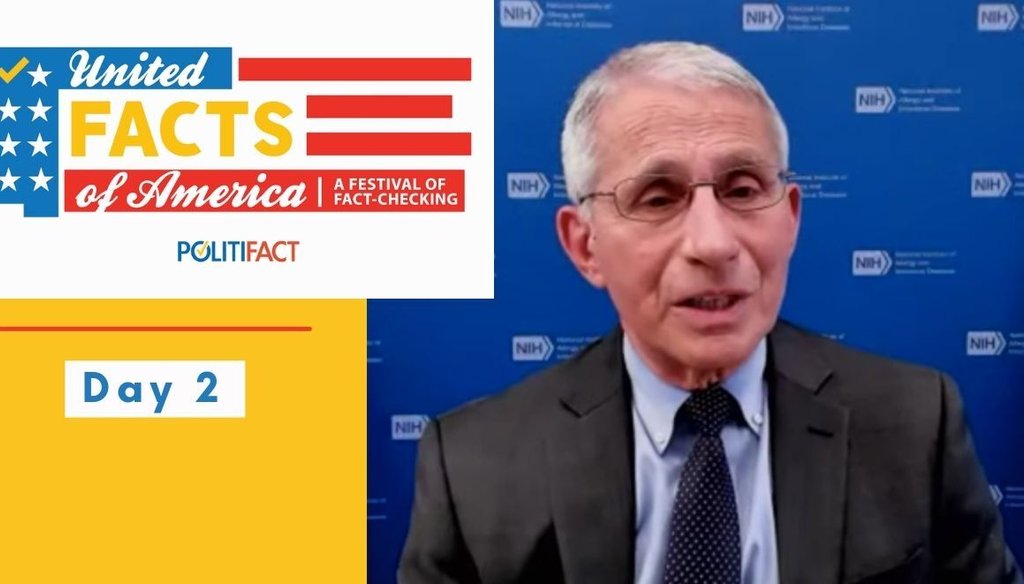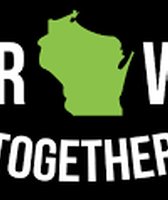Stand up for the facts!
Our only agenda is to publish the truth so you can be an informed participant in democracy.
We need your help.
I would like to contribute

If Your Time is short
-
Leading fact-checkers, journalists and others participated in the second day of United Facts of America: A Festival of Fact-Checking, a four-day event to discuss the role of facts in our democracy.
-
Dr. Anthony Fauci discussed his experiences fighting misinformation about the coroanvirus pandemic, COVID-19 and vaccines.
-
Health care journalists reflected on failures in communicating public health guidance. American's inexperience with pandemics, the evolving scientific knowledge and a fact-challenged president all contributed.
-
Dr. Daniel Fagbuyi shared his methods for getting accurate information to communities of color through social media.
Even after working as the director of the U.S. National Institute of Allergy and Infectious Diseases for 37 years under seven presidents, Dr. Anthony Fauci said Tuesday he never could have anticipated the level of misinformation that has arisen from the pandemic.
"I've never seen anything begin to approach … the divisiveness that we’re seeing, but also the distortion of reality," Fauci said. "There’s so much distortion of reality and complete misinformation out there that, you know, if it wasn’t so serious and have such a negative impact, it would almost be funny. But it’s not funny."
His remarks came Tuesday as part of an interview on coronavirus misinformation with PolitiFact managing editor Katie Sanders for the United Facts of America: A Festival of Fact-Checking. The virtual conference — held May 10 to May 13 by Poynter and PolitiFact — brings together fact-checkers, journalists, health care professionals and technology leaders for discussions about the importance of facts in a free society.
Of the countless false claims that have sprung up in the past year, the theories that certain interventions could cure COVID-19 and the claims that he personally was involved with the start of the pandemic have stood out the most, Fauci said.
Earlier in the pandemic, people without any medical experience, including former President Donald Trump, championed malaria drug hydroxychloroquine as a potential cure for the disease. Fauci often had to correct these claims — among others — putting him at odds with the White House. That was when he knew misinformation would become a major problem in the pandemic.
Sign up for PolitiFact texts
"Out of necessity and the maintenance of my own integrity, I had to come out and disagree with some of the things that President Trump said," Fauci said, citing the hydroxychloroquine incident as well as the time when Trump claimed the virus would disappear soon. "Then it became very clear that the attacks on me were getting more and more and more, and then the conspiracy theories started to come in."
Though the situation was "very stressful," Fauci said he never thought about quitting because he knew he was performing an important function.
In addition to correcting Trump, Fauci has spoken out against false claims perpetuated by public figures like Fox News host Tucker Carlson and comedian and podcaster Joe Rogan. Hours before his interview with PolitiFact, Fauci challenged a false claim by Sen. Rand Paul (R-Ky.) that the National Institutes of Health had funded risky virus research in Wuhan. Fauci reiterated his stance during the interview, calling Paul’s claim "preposterous."
Generally, though, Fauci said he avoids confrontations because they’re "distracting" and responds to false claims when they interfere with public health goals.
"When someone makes a statement that is, you know, egregiously incorrect and would actually counter the things that I and my public health colleagues are trying to do, then you feel it's almost your obligation to publicly correct it," Fauci said. "But I certainly don’t feel like I have to be the corrector of all the falseness out there."
Fauci said the past year has shown that the U.S. needs to build up its local public health systems and work more closely with other countries to prepare for future pandemics.
"As a rich nation, we do have the moral responsibility to make sure that other countries that are less fortunate than we, that they get the opportunity to get interventions, be they anti-HIV drugs, which we did with PEPFAR (The U.S. President's Emergency Plan for AIDS Relief), or it’s vaccines, which hopefully we’ll do now," Fauci said.
Those vaccines are key to controlling the pandemic, Fauci said. According to the Centers for Disease Control and Prevention, 58.5% of U.S. adults have received at least one vaccination. President Joe Biden has set a goal for the U.S. to reach 70% by July 4.
"I do believe by July, if we do get ... that number 70% of adults getting at least one vaccine, that the level of infection will be low enough that you're going to see a substantial pulling back on the rigidity of the recommendations and guidelines from the CDC," Fauci said. "I’m almost certain that that's going to happen."
RELATED STORY: Dr. Anthony Fauci disputes Sen. Rand Paul on Wuhan lab
Conditions in the U.S. were ripe for the spread of COVID-related misinformation, journalists said Tuesday, especially because of failures in communicating public health guidance.
In a discussion led by PolitiFact senior correspondent Jon Greenberg, The 19th* health and gender reporter Shefali Luthra, Atlantic staff writer Derek Thompson and Kaiser Health News editor-in-chief Elisabeth Rosenthal analyzed the spread of pandemic misinformation.
One major issue was that Americans simply were not used to the idea that infectious diseases could cause mass disaster, Rosenthal said. That mentality, combined with misinformation spread by Trump, made it easy for lies about the virus to perpetuate.
"We forgot about the terrorism of nature, so it was fertile ground for people to not believe that this could happen here like, ‘Oh yeah, that happens in China and India, but it doesn’t happen in the U.S.,’" Rosenthal said. "We started with a foundation of falsehood and willingness not to look at the truth."
Deep political divides made things worse, the journalists pointed out. Many aspects of the pandemic, such as mask-wearing, became politicized, and some people realized they could spread misinformation for political or financial gain.
Media outlets and public health officials tried to combat misinformation, an effort made difficult by the evolving nature of scientific recommendations, the journalists said. For example, early in the pandemic, the CDC did not recommend that people wear masks. That guidance changed as they gathered more research and evidence.
Though public health infrastructure in the U.S. had been decimated, hampering communication, Luthra said journalists had a responsibility to fill the gap.
"Even when health communicators aren't doing a great job communicating, we should do a good job communicating. That is our literal job," Luthra said. "I think it’s really important for us to think moving forward how we cover this sort of scientific consensus-building to help readers understand that it’s not always a bad faith error or a lie."
One country that did effectively communicate public health guidance was Japan, Thompson said. From the start of the pandemic, Japanese officials instructed the public to avoid the "Three C’s" — closed spaces, crowded places and close-contact settings. Those guidelines are effective in part because of how straightforward they are, he said.
"I do think that this is big and complicated, and I don’t want to sort of, you know, throw a whole bunch of blame on the FDA and the CDC here, but I think we could have done a better job communicating this in a simple and honest way," Thompson said.
Emergency room physician Dr. Daniel Fagbuyi appeared Tuesday to discuss his efforts to address vaccine hesitancy among people of color via social media.
Data from the Kaiser Family Foundation shows that Black and Hispanic adults are somewhat more likely than white adults to say they want to "wait and see" before getting vaccinated. Fagbuyi said he started engaging with other people of color on social media after realizing that many of the experts behind public health messaging are white.
"The message has to sometimes come from someone who actually represents a certain population. There wasn’t a voice that represented black and indigenous people of color," Fagbuyi said. "That was the impetus for me saying, ‘OK, you know what, I’m gonna start getting on social media and engaging our population of people who aren’t represented.’"
In his conversations with others, Fagbuyi said he walks people through different vaccine myths and concerns about vaccine shortages. He asks people for their "why" — or "why not" — to understand their stance on the COVID-19 vaccines. The process is a bit like guerrilla warfare, he said, in that he has to proactively seek people out, using available technology to broaden his reach.
"I use Zoom, Clubhouse, Facebook, whatever you have in regular media, print media, all those things to be able to engage these different pockets of populations that have their own different factions and different thoughts," Fagbuyi said. "When I understand where they are, I can meet them where they are to start to unravel some of the mistrust."
Our Sources
United Facts of America: A Festival of Fact-checking, May 11, 2021



























